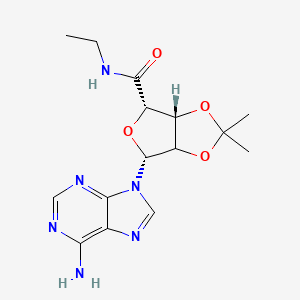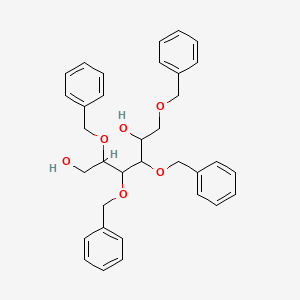
Acarbose
- 専門家チームからの見積もりを受け取るには、QUICK INQUIRYをクリックしてください。
- 品質商品を競争力のある価格で提供し、研究に集中できます。
説明
Acarbose is a complex oligosaccharide that acts as an inhibitor of several enzymes responsible for the breakdown of complex carbohydrates in the intestines. It is primarily used as an anti-diabetic drug to manage type 2 diabetes mellitus by controlling postprandial blood glucose levels. This compound works by inhibiting alpha-glucosidase, an intestinal enzyme that releases glucose from larger carbohydrates such as starch and sucrose .
準備方法
Synthetic Routes and Reaction Conditions: Acarbose is produced through a fermentation process involving the bacterium Actinoplanes sp. The biosynthesis involves the formation of acarviosin, which is then linked to maltose. The fermentation process is optimized by controlling the osmolality of the fermentation solution, which significantly affects the yield of this compound .
Industrial Production Methods: Industrial production of this compound involves large-scale fermentation using optimized conditions to maximize yield. The process includes the use of specific carbon sources, such as a mixture of maltose and glucose, to enhance the biosynthesis of this compound. The fermentation is carried out in bioreactors with controlled parameters such as temperature, pH, and oxygen supply .
化学反応の分析
Types of Reactions: Acarbose undergoes various chemical reactions, including hydrolysis and enzymatic degradation. It is primarily involved in inhibition reactions where it binds to alpha-glucosidase enzymes, preventing the breakdown of complex carbohydrates .
Common Reagents and Conditions: The common reagents used in the reactions involving this compound include alpha-glucosidase enzymes and substrates such as maltose and sucrose. The reactions typically occur under physiological conditions in the gastrointestinal tract .
Major Products Formed: The major products formed from the reactions involving this compound are glucose and other simple sugars, which are released from the breakdown of complex carbohydrates .
科学的研究の応用
Acarbose has a wide range of scientific research applications, including:
Chemistry: this compound is used as a model compound to study enzyme inhibition and carbohydrate metabolism.
Biology: It is used to investigate the role of alpha-glucosidase in various biological processes and to study the effects of enzyme inhibition on cellular functions.
Medicine: this compound is widely used in the treatment of type 2 diabetes mellitus to control postprandial blood glucose levels. .
Industry: this compound is used in the pharmaceutical industry for the production of anti-diabetic medications. .
作用機序
Acarbose exerts its effects by inhibiting alpha-glucosidase enzymes located in the brush-border of the intestinal mucosa. These enzymes are responsible for metabolizing oligo-, tri-, and disaccharides into absorbable simple sugars. By inhibiting these enzymes, this compound limits the absorption of dietary carbohydrates and reduces the postprandial increase in blood glucose and insulin levels . The inhibition is competitive and reversible, and this compound mimics the transition state of the substrate with its amine linkage .
類似化合物との比較
Voglibose: Another alpha-glucosidase inhibitor used to manage postprandial blood glucose levels in diabetic patients.
Miglitol: An alpha-glucosidase inhibitor that is structurally different from acarbose and voglibose.
Uniqueness of this compound: this compound is unique due to its complex oligosaccharide structure and its ability to inhibit multiple enzymes involved in carbohydrate metabolism. It has been shown to be effective in reducing postprandial blood glucose levels and improving cardiovascular outcomes in diabetic patients .
特性
CAS番号 |
56810-94-0 |
|---|---|
分子式 |
C25H43NO18 |
分子量 |
645.6 |
製品の起源 |
United States |
試験管内研究製品の免責事項と情報
BenchChemで提示されるすべての記事および製品情報は、情報提供を目的としています。BenchChemで購入可能な製品は、生体外研究のために特別に設計されています。生体外研究は、ラテン語の "in glass" に由来し、生物体の外で行われる実験を指します。これらの製品は医薬品または薬として分類されておらず、FDAから任何の医療状態、病気、または疾患の予防、治療、または治癒のために承認されていません。これらの製品を人間または動物に体内に導入する形態は、法律により厳格に禁止されています。これらのガイドラインに従うことは、研究と実験において法的および倫理的な基準の遵守を確実にするために重要です。


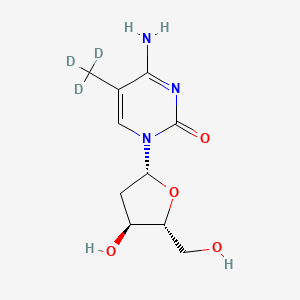
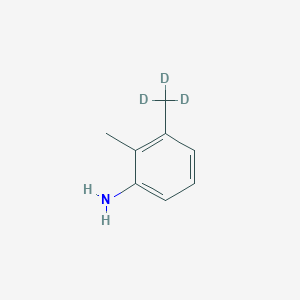
![(1S,3S,6R,7Z,10E,13R,16S,17S,18S,21R,22R)-17-[(2R,4R,5S,6R)-5-[(3,5-dichloro-1H-pyrrole-2-carbonyl)amino]-4-hydroxy-6-methyloxan-2-yl]oxy-3,22-diethyl-23-hydroxy-6,8,18-trimethyl-25,27-dioxo-26-oxapentacyclo[22.2.1.01,6.013,22.016,21]heptacosa-4,7,10,14,23-pentaene-4-carboxylic acid](/img/structure/B1140538.png)
![Tert-butyl-7-[4-(4-fluorophenyl)-6-isopropyl-2-methylsulfonylpyrimidin-5-YL]-(3R,5S)-isopropylidene-(E)-6-heptenoate](/img/structure/B1140539.png)
![tert-Butyl-7-[4-(4-fluorophenyl)-6-isopropyl-2-mesylaminopyrimidin-5-yl]-(3R,5S)-isopropylidine-(E)-6-heptenoate](/img/structure/B1140540.png)
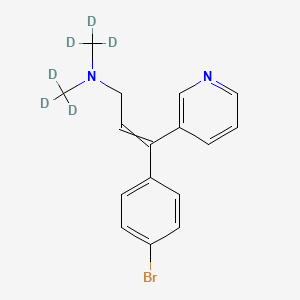
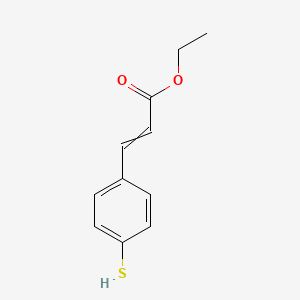
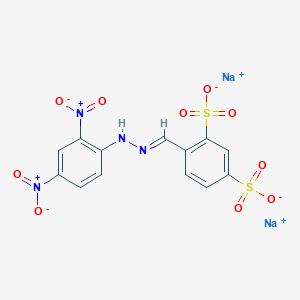
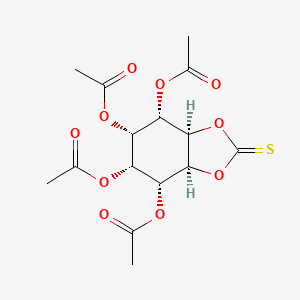
![(7S,11S,12S,13S,14R,15R,16R,17S,18S)-1'-tert-butyl-2,13,15,17,32-pentahydroxy-11-methoxy-3,7,12,14,16,18,22-heptamethylspiro[8,33-dioxa-24,27,29-triazapentacyclo[23.6.1.14,7.05,31.026,30]tritriaconta-1(32),2,4,9,19,21,24,26,30-nonaene-28,4'-piperidine]-6,23-dione](/img/structure/B1140550.png)
